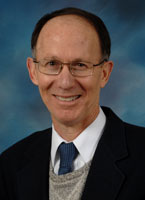Richard S. Hotchkiss, MD

Richard S. Hotchkiss, MD, is professor of anesthesiology, medicine, surgery and developmental biology at Washington University School of Medicine. Hotchkiss’s career has focused on advocating for the critically ill and injured and studying multiple organ dysfunction syndrome. He is internationally known for his seminal research explaining the role of lymphocyte programmed cell death as an underlying cause of sepsis. Sepsis is a serious condition of whole-body infection and inflammation that can lead to multiple organ failure and death. It kills more than 200,000 Americans every year. Hotchkiss’s work highlights one of the primary reasons why critically ill patients succumb to overwhelming infections and points to better methods to block sepsis.
Hotchkiss has published more than 160 scientific papers. His work has appeared in the world’s most prestigious scientific journals including Science, Nature, the New England Journal of Medicine, and the Journal of the American Medical Association.
Hotchkiss earned his medical degree from the University of Virginia in 1976. He completed his medicine residency at Emory University in Atlanta and then completed his medical training with an intensive care fellowship and anesthesiology residency at Massachusetts General Hospital in Boston. He held faculty positions at Harvard and Emory University before joining the Washington University School of Medicine faculty in 1987. He became a professor in 2002.
At Washington University, Hotchkiss is considered a superb clinician and research mentor who has had a significant impact on the next generation of scientists. He receives significant ongoing support from several federal sources, including a National Institutes of Health (NIH) Merit Award and an $8 million grant from the Department of Defense. He has served as president of the Shock Society and has served on several NIH study sections, including as a permanent member of the NIH Surgery, Anesthesiology Trauma Study Section. In 2003, he spoke at the 124th Nobel Symposium on Septicemia and Shock in Stockholm, Sweden.




